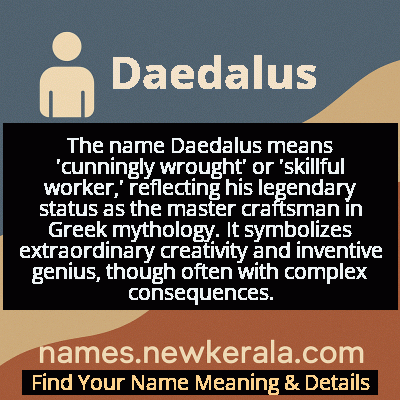Daedalus Name Meaning & Details
Origin, Popularity, Numerology Analysis & Name Meaning of Daedalus
Discover the origin, meaning, and cultural significance of the name DAEDALUS. Delve into its historical roots and explore the lasting impact it has had on communities and traditions.
Name
Daedalus
Gender
Male
Origin
Greek
Lucky Number
4
Meaning of the Name - Daedalus
The name Daedalus means 'cunningly wrought' or 'skillful worker,' reflecting his legendary status as the master craftsman in Greek mythology. It symbolizes extraordinary creativity and inventive genius, though often with complex consequences.
Daedalus - Complete Numerology Analysis
Your Numerology Number
Based on Pythagorean Numerology System
Ruling Planet
Uranus (Rahu)
Positive Nature
Strong sense of order, loyal, practical, and disciplined.
Negative Traits
Stubborn, overly serious, rigid, and prone to feeling restricted.
Lucky Colours
Blue, gray.
Lucky Days
Saturday.
Lucky Stones
Blue sapphire.
Harmony Numbers
1, 7, 8.
Best Suited Professions
Managers, engineers, accountants, organizers.
What People Like About You
Dependability, discipline, practicality.
Famous People Named Daedalus
Daedalus of Athens
Mythical Architect and Inventor
Designed the Labyrinth for King Minos and created wings for human flight
Daedalus (Literary Character)
Mythological Figure
Central figure in classical literature symbolizing human ingenuity and its consequences
Daedalus (Artistic Reference)
Cultural Archetype
Inspired countless artists and writers exploring creativity and technological innovation
Name Variations & International Equivalents
Click on blue names to explore their detailed meanings. Gray names with will be available soon.
Cultural & Historical Significance
The murder of his nephew Talos (or Perdix), driven by jealousy of the young inventor's superior creations, reveals the dark side of genius and the consequences of unchecked ambition. This duality makes Daedalus a profoundly human figure whose legacy continues to resonate in discussions about innovation, ethics, and the price of progress. Throughout Western culture, he has become a symbolic touchstone for debates about technological advancement, artistic creation, and the moral dimensions of human achievement.
Extended Personality Analysis
Individuals named Daedalus are typically associated with exceptional creativity, intellectual brilliance, and remarkable problem-solving abilities. They possess an innate talent for invention and design, often thinking outside conventional boundaries to create innovative solutions. This creative genius is complemented by intense ambition and a drive to push beyond established limits, whether in art, science, or technology. Their minds work in complex, labyrinthine patterns, capable of conceiving structures and systems of great sophistication.
However, this same brilliance can manifest as arrogance or jealousy when confronted with others' talents, particularly from younger or less experienced individuals. The Daedalian personality often struggles with the ethical implications of their creations and may face moral dilemmas when their ambitions conflict with human relationships. They tend to be visionary but sometimes impractical, brilliant yet emotionally complex, embodying the eternal tension between human aspiration and human limitation that defines their mythological namesake.
Modern Usage & Popularity
In contemporary times, Daedalus remains an uncommon but powerful given name, primarily used by parents with strong interests in classical mythology, literature, or who wish to convey themes of creativity and innovation. The name sees occasional use in academic and artistic circles, often chosen by intellectuals and creatives who appreciate its mythological depth and symbolic weight. While not appearing on popular baby name charts, it maintains a steady presence as a distinctive choice that suggests intelligence, craftsmanship, and visionary thinking. Its usage has seen minor increases during periods of technological advancement or in science fiction contexts, reflecting ongoing cultural fascination with the themes his story represents. The name is more frequently encountered in literary references, academic discussions, and as inspiration for technological projects than as a common personal name.
Symbolic & Spiritual Meanings
Daedalus symbolizes the dual nature of human ingenuity—both its glorious potential and its perilous consequences. He represents the archetypal creator whose inventions can liberate humanity from natural constraints while simultaneously creating new forms of imprisonment. The Labyrinth he designed symbolizes both the complexity of the human mind and the traps of over-intellectualization, while his waxen wings embody the fragile boundary between aspiration and hubris. In modern contexts, Daedalus has become a symbol for scientific and technological innovation, particularly in discussions about artificial intelligence, genetic engineering, and other fields where human creation might escape its creator's control. He stands as an eternal reminder that every act of creation carries responsibility and that the same genius that builds wonders can also construct prisons, making him a powerful metaphor for the modern technological age.

